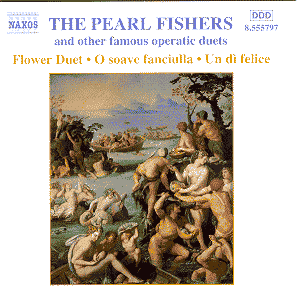


BUY NOW
The Pearl Fishers and other famous operatic
duets
Georges BIZET (1838-1870)
Les Pecheurs de perles, ‘Au fond du temple saint’ (Janez
Lotric (ten), Igor Morozov (bar)
Léo DELIBES (1836-1891)
Lakme, ‘Dome épais, le jasmin’ Adrianna Kohútková
(sop), Denisa Slepkovska (m.sop)
Giacomo PUCCINI (1858-1924)
La Bohème, ‘Mimi!…Speravo di trovarti qui’ Luba Orgonasova
(sop), Jonathan Welch (ten)
La Bohème, ‘In un coupé’ Jonathan Welch (ten),
Fabio Previati (bar)
La Bohème, ‘O soave fanciulla’ Luba Orgonasova (sop),
Jonathan Welch (ten)
Madama Butterfly ‘Viene la serra’ (abbreviated
love duet). Miriam Gauci (sop), Yordi Ramiro (ten)
Manon Lescaut, ‘O saró la piú bella’
Miriam Gauci (sop), Kaludi Kaludov (ten)
Tosca, ‘Mario…Son qui’ Nelly Miricioiu (sop), Giorgio Lamberti
(ten)
Giuseppe VERDI (1813-1901)
Don Carlo, ‘E lui…Dio che nell’alma infondere’ Giacomo Aragall
(ten), Eduard Tumagian (bar)
La forza del destino, ‘olenne in quest’ora’ Giacomo Aragall
(ten), Eduard Tumagian (bar)
Otello, ‘Era la notte… Sí, pel ciel marmareo’ Janez
Lotric (ten), Igor Morozov (bar)
Gaetano DONIZETTI (1797-1868)
L’Elisir d’amore, ‘La donna é un animale…Venti scudi!’
Giacomo Aragall (ten), Eduard Tumagian (bar)
Gioachino ROSSINI (1792-1868)
Il barbiere di Siviglia, ‘All’idea di quell metallo’ Ramon
Vargas (ten), Roberto Servile (bar)
Various orchestras and conductors. No recording dates given
Bargain Price
![]() NAXOS 8.555797 [77.59]
NAXOS 8.555797 [77.59]